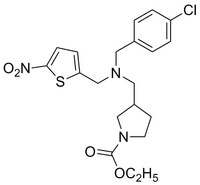554726 Sigma-AldrichREV-ERB Agonist II, SR9009 - Calbiochem
REV-ERB Agonist II, SR9009, CAS 1379686-30-2, acts as a specific REV-ERB-α/β agonist that exhibits a direct and reversible binding (Kd = 800 nM).
More>> REV-ERB Agonist II, SR9009, CAS 1379686-30-2, acts as a specific REV-ERB-α/β agonist that exhibits a direct and reversible binding (Kd = 800 nM). Less<<REV-ERB Agonist II, SR9009 - Calbiochem MSDS (material safety data sheet) or SDS, CoA and CoQ, dossiers, brochures and other available documents.
同义词: Ethyl-3-(((4-chlorobenzyl)((5-nitrothiophen-2-yl)methyl)amino)methyl)pyrrolidine-1-carboxylate
Recommended Products
概述
| Replacement Information |
|---|
重要规格表
| CAS # | Empirical Formula |
|---|---|
| 1379686-30-2 | C₂₀H₂₄ClN₃O₄S |
Products
| 产品目录编号 | 包装 | 数量 / 包装 | |
|---|---|---|---|
| 554726-25MGCN | 玻璃瓶 | 25 mg |
| References | |
|---|---|
| References | Solt, L.A., et al. 2012. Nature 485, 62. |
| Product Information | |
|---|---|
| CAS number | 1379686-30-2 |
| Form | Dark brown liquid |
| Hill Formula | C₂₀H₂₄ClN₃O₄S |
| Reversible | Y |
| Structure formula Image | |
| Quality Level | MQ100 |
| Applications | |
|---|---|
| Application | REV-ERB Agonist II, SR9009, CAS 1379686-30-2, acts as a specific REV-ERB-α/β agonist that exhibits a direct and reversible binding (Kd = 800 nM). |
| Biological Information | |
|---|---|
| Primary Target | REV-ERB-α/&beta |
| Purity | ≥96% by HPLC |
| Physicochemical Information | |
|---|---|
| Cell permeable | Y |
| Dimensions |
|---|
| Materials Information |
|---|
| Toxicological Information |
|---|
| Safety Information according to GHS |
|---|
| Safety Information |
|---|
| Product Usage Statements |
|---|
| Packaging Information | |
|---|---|
| Packaged under inert gas | Packaged under inert gas |
| Transport Information |
|---|
| Supplemental Information |
|---|
| Specifications |
|---|
| Global Trade Item Number | |
|---|---|
| 产品目录编号 | GTIN |
| 554726-25MGCN | 04055977193145 |
Documentation
REV-ERB Agonist II, SR9009 - Calbiochem MSDS
| 职位 |
|---|
REV-ERB Agonist II, SR9009 - Calbiochem 分析证书
| 标题 | 批号 |
|---|---|
| 554726 |
参考
| 参考信息概述 |
|---|
| Solt, L.A., et al. 2012. Nature 485, 62. |







